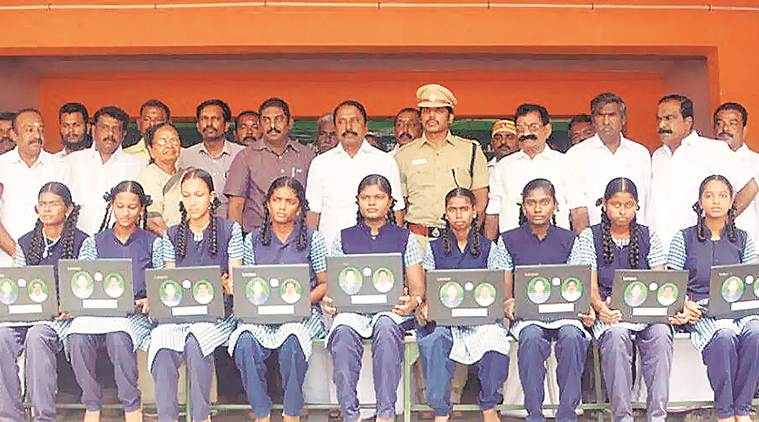
On Teacher’s Day, Tamil Nadu’s school education minister K A Sengottaiayan took everyone by surprise when he announced a bold new scheme that aims to turn old fashioned classrooms into digital ones. Sengottaiayan had just returned from Finland, where he studied their model of the school education system, and wanted to reform the state’s school system on similar lines.
As part of a comprehensive package, the state government has launched a new television channel dedicated exclusively for school students. In the past, TN had provided free laptop computers to students. In the latest announcements, it promised a laptop for every teacher in government and government-aided school in the state. To complete the digital experience, classrooms are also set to get a massive makeover that will see blackboards being replaced by digital boards and students receiving “smart” report cards with QR codes. The disbursal of laptops is already underway in higher secondary schools, and the state is figuring out how to provide it for the rest of the eligible teachers in the state.
This is not the first time that Tamil Nadu has led with such an innovation aimed at improving education and health systems in the state. The laptop scheme for students, for instance, attracted a lot of experts from other states, wanting to study its feasibility. The fact is, regardless of which political party ruled the state, Tamil Nadu has been known for unconditional allocation of funds in education and health systems.
Ever since the 1960s, when the government of K Kamaraj pioneered the midday meal scheme in Tamil Nadu to prevent school dropouts and to increase the number of students coming to schools, the state has led the country in unveiling one innovative scheme after another. The state has pioneered several schemes that have made its public education system one of the finest in the country. Often enough, the state’s schemes have served as models that have been replicated in the rest of the country.
What are digital classrooms
Tamil Nadu’s public schools ecosystem is being overhauled. All govt school teachers are being given laptops, classrooms are being equipped with smart boards and schools are being brought online. Students can now get smart report cards, complete with QR codes for ease of access. There’s even a full-fledged TV channel, with a YouTube link, solely for the curriculum.
Pradeep Yadav, the school education secretary who accompanied the minister Sengottaiayan on the Finland trip, said the government aims to bring a new learning experience in schools. “We may not be able to bring a radical change like in Finland but we had a visit as we have been hearing a lot about Finland and their wonderful model of education. We may be able to contextualise our system, and improve our quality of teaching and learning with lessons from Finland,” said Yadav, adding that they have already digitised report cards of school students with a QR code. “Parents who use the QR code will get details of the student in our portal, which includes attendance, marks and other academic performances,” he explained. Classrooms are being digitised and each school will have a dedicated server which will be connected to the main server.
Kalvi, a television channel launched last month with a team of 50 selected school teachers from across the state; they are assisted by professionals who help them to run the channel. Yadav said that generating content is a major challenge in the initial stages of the television project. “We have started airing lectures. The channel is now available in government-owned Arasu Cable network. But accessibility and reach is still a problem as there may be families who do not have access to this network. We are uploading all programmes onto a YouTube channel as well as the website of the education department where students can access the content even if they miss the broadcast on TV,” Yadav said. The state government is planning to write to the Centre to make the channel available on Doordarshan as well.

The state school education department was provided with an allocation of Rs 27,205 crore in the last financial year. But, funding such an ambitious initiative is a concern. For instance, there are around 2.9 lakh school teachers eligible for a laptop in the scheme. As a pilot project, the government has already distributed some 29,000 laptops; each costing about Rs 12,000. Yadav said the government is exploring ways to implement the scheme. For instance, digitising classrooms with digital boards, instead of blackboards, is a project funded by the central government.
Apart from these digital changes, the government is also spending money on improving the other infrastructure as well. Already, Rs 721 crore has been spent in the last two years to provide school buildings, toilets, drinking water, compound wall, kitchens and facilities for children with special needs.